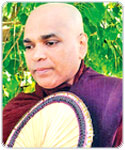|
The reason for sadness should not be love
 Dr. Most Venerable Dr. Most Venerable
Mirisse Dhammika Nayaka Thero
“Various kinds of sadnesses, weepings and lamentations are repercussions of
worldly desires. Hence, non-existence of clinging towards someone or something,
leads to absence of negative feelings and actions such as sadness, weepings and
lamentations.”
“Thus, an intelligent person who can live without craving for someone or
something, would be able to exist without any sorrows. Hence, if one wishes to
get away from sadness and the mist of defilments to obtain the arahathhood, it
is necessary for him to termmate craving and possessiveness for everybody or
everything”.
 The above mentioned stanzas are obtained from Vishaka Sutra of the
Pataleegameeya section, which is mentioned in the UdanaPaliya. Further, the
meanings of those two are also stated while the Buddha was occupying
MigaramathaPasada known as Poorvaramaya in Shrawasthi. One afternoon, Vishaka
approached the Buddha not like the other days, but with wet clothes and wet
hair. When the reason was asked why she came in such a manner, she respectfully
answered that she came in with an unbearable grief because one of her
granddaughters had passed away. When she venerated the Buddha and sat aside, the
Buddha inquired her, whether she liked to have sons and daughters,
grand-daughters and grand-sons as many as the number of people living in
ShrawasthiNuwara(in the city of Shrawasthi). She readily replied that she wished
to have as many as grand children as the number of people. Again, the Buddha
asked her wither she knew the specific number of people who die in a day in the
city of Shrawasthi. She replied “I know ten people die daily in Shrawasthi, nine
people die daily, eight people die daily, seven people die daily, six people die
daily, five people die daily, four people die daily, three people die daily, two
people die daily, even one person die daily and the city of Shrawasthi is never
without dying people. The Buddha inquired her again “Vishakha, what to you
think? If you consider that all the children in the city of Shrawasthi one your
grand children and if ten die daily or even if one dies daily, you won’t be able
to stay without wet clothes and wet hair. Is that possible?” After realizing the
truth, Vishakha replied that it won’t be practicable. Further she replied that
she would have no benefit of having so many sons and daughters or
grand-daughters or grand-sons. The above mentioned stanzas are obtained from Vishaka Sutra of the
Pataleegameeya section, which is mentioned in the UdanaPaliya. Further, the
meanings of those two are also stated while the Buddha was occupying
MigaramathaPasada known as Poorvaramaya in Shrawasthi. One afternoon, Vishaka
approached the Buddha not like the other days, but with wet clothes and wet
hair. When the reason was asked why she came in such a manner, she respectfully
answered that she came in with an unbearable grief because one of her
granddaughters had passed away. When she venerated the Buddha and sat aside, the
Buddha inquired her, whether she liked to have sons and daughters,
grand-daughters and grand-sons as many as the number of people living in
ShrawasthiNuwara(in the city of Shrawasthi). She readily replied that she wished
to have as many as grand children as the number of people. Again, the Buddha
asked her wither she knew the specific number of people who die in a day in the
city of Shrawasthi. She replied “I know ten people die daily in Shrawasthi, nine
people die daily, eight people die daily, seven people die daily, six people die
daily, five people die daily, four people die daily, three people die daily, two
people die daily, even one person die daily and the city of Shrawasthi is never
without dying people. The Buddha inquired her again “Vishakha, what to you
think? If you consider that all the children in the city of Shrawasthi one your
grand children and if ten die daily or even if one dies daily, you won’t be able
to stay without wet clothes and wet hair. Is that possible?” After realizing the
truth, Vishakha replied that it won’t be practicable. Further she replied that
she would have no benefit of having so many sons and daughters or
grand-daughters or grand-sons.
The Buddha, further explained to her, “Vishaka, if one maintains hundred
attachments then, he has to be said for hundred times. If a person has ninety
attachments, he has to be sad for ninety times. If a person develops eighty
attachments, he has to be weeping for eighty times. If a person holds seventy
attachments, weeping has to be done for seventy times. If a person has sixty
attachments, he has to be sad for sixty times. If a person entertains fifty
attachments, he would be sad for fifty times. If one holds forty attachments
that would make him sad for forty times. If one holds thirty attachments, he
would be sad for thirty times. If one holds twenty attachments, he would be sad
for twenty times. If one develops ten attachments, he would have to be sad for
ten times. Furthermore, if one craves for nine, he would be sad for nine times.
If one craves for eight, he would be miserable for eight times. If one holds
eight attachments, he would face sadness for eight times. If one maintains seven
attachments, there would be seven times for him to be sad. If one holds six
attachments, he would face sadness for six times.
If one holds five attachments, he would have to be sad for five times. If there
are four attachments, one would be miserable for four times. Moreover, if one
maintains three attachments, he would be sad for three times. If one develops
two attachments, he would face sadness for two times. In addition to that, if a
person holds on to one attachment, he would have to face sadness once. If one
does not maintain any attachments, he would neither live with grief or
greediness nor would have an extremely painful mental sate combined with
lamentations. Try to remember this summary of what the Buddha has preached, in
his sermons of dhamma.
‘If a person is not attached to anyone or anything, he would not be sad.”
While staying with ‘I’ conventionally, one should be able to utilize knowledge
and insight wisdom in order to abandon the so called ‘I’. If a person cannot
commit according to the insight wisdom and cannot form a conditioned mind,
attachments towards all animate and inanimate beings or objects would make that
person face immeasurable sorrows, sadnesses, lamentations and grievances.
Clinging cravingly added with lust would generate cankers. The cankers mentioned
here are the Pupancha such as cravings, infatuation, pride and speculative
opinions. All these will give rise a probability to initiate the process of
existence and mainly to be born in the four lower worlds. The five bundle of
agrigates called ‘I’ is grasped until all the cankers are eradicated. However,
it is still held, clinging to the ideas ‘If is mine’. Cankers won’t florish
based on the five bundle of agrigates, if the mind is conditioned on
Thilakkhana; Anithya, Dukkha and Anaththa. One would have the wisdom and
perception to condition the mind to think that nothing or nobody really exist,
eventhough thoughts of vision are contend, conventionally on faculties such as
the eye further, those faculties, objects which cause foundations for the sence
perceptions, function of consciousness, touch and feelings are only activities
of the root condition. It is significant to have a conditioned mind based on the
four foundations of mindfulness regarding satisfaction, consequences and
relinquishment. (not to associate, thing with cankers).
Ideas and feelings generated in an unconditioned mind would lead to attachment
or friction. There would be desputes with sorrows and lamentations, whenever
there is attachment or clinging to someone or something when gradual and
impermenancy can be noticed in them. Covetousness and antipathy, in other words
extreme stinginess and strong feelings of dislike can be abandoned pertaining to
ultimate knowledge and such a person can have the opportunity to be detached
from what he yearns for, even if thereare bonds, conventionally, so that, he
would not have any grief which is always associated with antipathy and grade.
While inviting to cultivate and succeed to gain tranquility and insight, in
order to understand the ultimate language, a line of dhamma, which was preached
to the ordinary man with an unconditioned mind, who is possessed with all the
fetters, is stated have to remind the grief owned by a person with an
unconditioned mind.
Do not associate with whom you crave for never socialize with undesirable
people. Absence of connection with whom you crave for bring graveness. In the
same manner, getting socialized with undesirable people also generate sorrow.
Hence, do not get attached to create bonds with anyone or anything. Loosing
somebody whom you are bonded with brings extreme sorrow. One who does not own
likings or dislikings would be abandoned of knots of defilements.
It is the nature of the world that all the things we are attached are not only
tend to change but also they have the quality of impermanency. Even if you are
conventionally attached to someone or something together with moral excellence
manifested in speech and bodily actions, do not cling to them conditioning your
mind on insight language. In other words, do not crave for anything. This would
pave the way to understand Dhamma.
May this show you the way to understand the four noble truths!
|